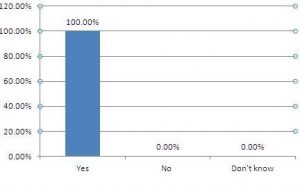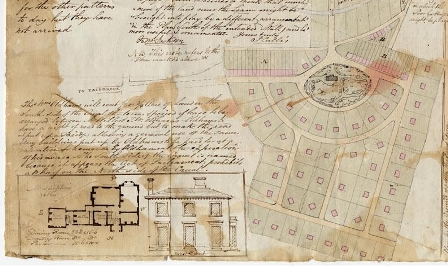
Some responses are not too hard to interpret: Do you keep an accessions register?
I posted back in November about our annual survey, Accessions to Repositories, which maps new material taken in by archive services across the UK. I also mentioned that we were asking the services who participate in Accessions to Repositories to tell us how they find the experience, and what we can do to help them. We now have the results, and they make interesting reading.
Overview
I’m glad to say that over 100 archive services took the time to respond – that’s over a third of the total who participate in the Accessions to Repositories exercise – and that there was a good mix of types of archive: local and specialist, national and higher education archives were all represented. We’d like to thank all who responded.
It was good to see that everyone who responded keeps a register of accessions! This is a vital tool in understanding the holdings of any archive service: where they came from, who actually owns them and what restrictions may be placed on their care and use. 88% of respondents also have a collecting policy, which usually defines what archive material they acquire (and, importantly, what they do not), on what terms they will take in archives and what types of archive they are able to care for and make available. Again, that’s a core part of defining the service offered and it is good to find it so consistently. The vast majority of respondents (over 90%) agreed that Accessions to Repositories is a valuable resource for researchers, highlighting how important it can be to share information on what new archive material is taken in by archive services.
What pleased us
The vast majority of respondents (over 90%) agreed that Accessions to Repositories is a valuable resource for researchers, highlighting how important it can be to share information on what new archive material is taken in by archive services.
Everyone who responded felt that the timescale for the project was reasonable: we allow three months for services to send in their returns from the previous year. They also agreed (97%) that the information we collect corresponds with the information that they already record about new accessions. Obviously, we don’t want to put unreasonable burdens on archive services, so it’s great to hear that this format and timetable works for our stakeholders.
What surprised us
There was a big spread of time required to create a return ready for Accessions to Repositories. Almost three-quarters of respondents took half a day or less to collate the information, but 7% took a week or more. We’d love to know what underlies those numbers, considering all respondents keep an accessions register, 97% of which contain the information we request. It would be good to know whether some systems support getting the data out more effectively than others, or whether it’s some other difference in approach.
What we need to think about for the future
Almost 60% felt that participating in Accessions to Repositories was good publicity for their service. That’s not bad, but we’d like to improve on it. Collecting new archives is an exciting process, and we want to make sure we do the best we can to highlight the importance of new archives becoming available for research.
There was a lot of disagreement over whether, in our editorial work on Accessions to Repositories, The National Archives successfully highlights the most significant accessions. I should explain that we use the survey primarily to update the National Register of Archives, and then transfer particularly interesting or unusual material to the Accessions to Repositories pages where it is highlighted. So not everything that is reported to us appears on the dedicated survey pages. We need to review whether we are getting that balance right and, following the questionnaire, we decided to include an additional field in our accessions template which lets archives tell us which accessions are considered particularly significant to that archive service and its users.

CR4141/5/189/48: from the Willes Archive, purchased by Warwickshire County Record Office in 2007
Only 38% of respondents have a collection development policy, and 7% weren’t sure whether they did or not. Collections development is an area identified as a priority for the sector, because if archives are to represent the communities they serve it sometimes requires a more proactive approach, whether through surveying areas which aren’t well represented in collections, raising funds to acquire collections that would otherwise be lost to the public, or undertaking projects to document quite ephemeral but significant events like London 2012. It’s somewhere we are putting time and effort into developing support for the sector. The new Archive Service Accreditation will ask all archive services what plans they have to develop their collections, and our new project for Archiving the Arts is an example of activity in this area. We’d like to see collections development more firmly on the map as a core part of archive work, and will continue our work in this area.
There was a mix of responses too to the questions about how we can improve Accessions to Repositories for the future. For example, we asked whether it would be useful to fill out a template online, and over 40% liked that option – but 30% really didn’t like it at all. Almost half would find it useful to export their accessions register directly to our systems – but equally, half would not. And the most positive response was to the status quo – just emailing in a return. It looks as though this mix of responses demands a mix of options for the future. We’ll keep you posted!
As you say it is good that the ons that were asked keep an Accessions Register (could they make this available?), I think alarm bells would be ringing if they did not have a register. I can understand the different approaches by archives as some have more money than others and are local and what suits them doesn’t suit everyone else and vice-versa. I would not expect every archive to have electronic systems to record something which is better and cheaper to keep on paper, as long as it works for them.
It does seem strange that you can collect archives without having a collections policy (how do you not know whether you have one or not!), albeit that some accessions would be family or company records. I can see that that the issue of TNA highlighting or not some record can be difficult as TNA operates on a national rather than a local level. I would add that not all interesting files at TNA are highlighted, the recent file about the East German Government wanting details of individuals living in the UK, it turns out this was for family contacts.
Thanks for your interest. It would indeed be worrying to find an actively collecting service that didn’t keep records of what they collected. This happened quite frequently in the early years of developing UK archive services, and created a headache for successors in trying to manage material without provenance.